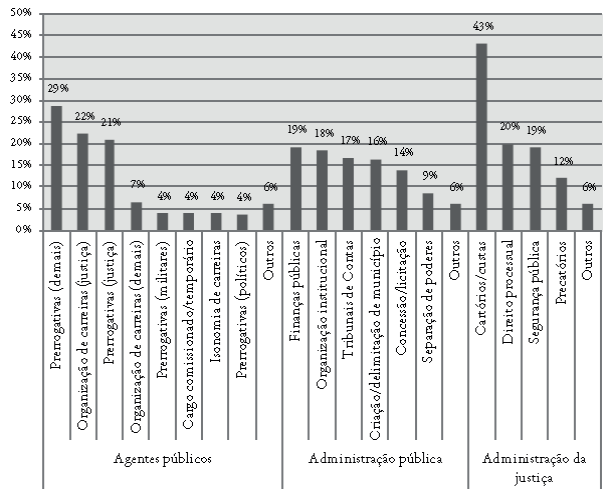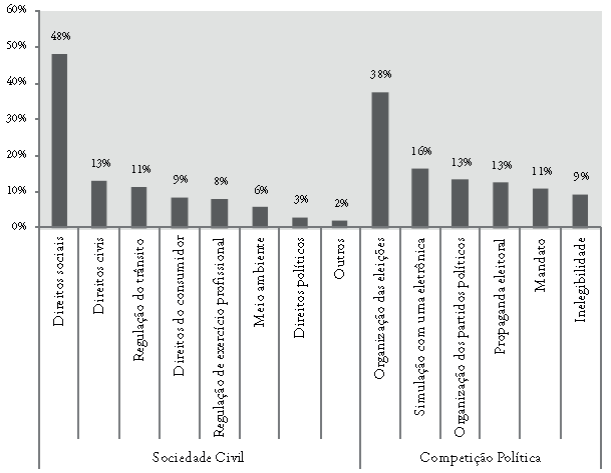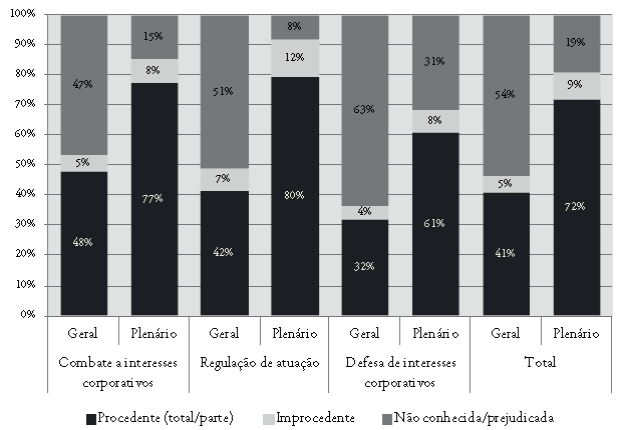ABSTRACT
In this paper we discuss the roles that Brazil's Supreme Court (stf) has played while arbitrating interests in dispute in the constitutionality control of laws, through judicial review cases (adis). For this, we rely on quantitative analysis of adis judged by the court between the years 1988 and 2014, mapping the content of the Court's decision-making agenda and the scope of its decisions, determining to what extent the Supreme Court has made a difference in arenas of social and political conflict in the country. We conclude that despite taking part in important disputes in arenas of social and political conflict, Supreme Court's agenda has been taken by issues related to the delineation of public careers, deciding on expansion or restraint of state bureaucracy prerogatives. Among the different roles that the current literature on judicialization of politics has attributed to Supreme Courts around the world, in a scenario of expanding political power of the judiciary, we found out that in Brazil, more than a countermajoritarian institution, or an instance to advance social and collective rights, Supreme Court has played the role of a true corporate deliberation body.
Keywords:
Supreme Court; Decision-making agenda; Judicial review; Judicialization of politics; Civil servants

 Thumbnail
Thumbnail
 Thumbnail
Thumbnail
 Thumbnail
Thumbnail
 Thumbnail
Thumbnail
 Thumbnail
Thumbnail
 Thumbnail
Thumbnail
 Thumbnail
Thumbnail
 Thumbnail
Thumbnail
 Thumbnail
Thumbnail
 Thumbnail
Thumbnail
 Thumbnail
Thumbnail
 Thumbnail
Thumbnail
 Base: 2.712 adis com decisão final, julgadas de outubro de 1988 a julho de 2014
Base: 2.712 adis com decisão final, julgadas de outubro de 1988 a julho de 2014
 Base: adis com decisão final, julgadas de outubro de 1988 a julho de 2014: agentes públicos, 1.093; administração pública, 401; administração da justiça, 200
Base: adis com decisão final, julgadas de outubro de 1988 a julho de 2014: agentes públicos, 1.093; administração pública, 401; administração da justiça, 200
 Base: ADIS com decisão final, julgadas de outubro de 1988 a julho de 2014: regulação da economia, 229; política tributária, 277
Base: ADIS com decisão final, julgadas de outubro de 1988 a julho de 2014: regulação da economia, 229; política tributária, 277
 Base: adis com decisão final, julgadas de outubro de 1988 a julho de 2014: sociedade civil, 384; competição política, 128.
Base: adis com decisão final, julgadas de outubro de 1988 a julho de 2014: sociedade civil, 384; competição política, 128.
 Base: adis com decisão final, julgadas de outubro de 1988 a julho de 2014: pgr, 538; governadores, 737; oab, 103; associações, 688; partidos políticos, 577; mesa assembleia, 32; outros, 37
Base: adis com decisão final, julgadas de outubro de 1988 a julho de 2014: pgr, 538; governadores, 737; oab, 103; associações, 688; partidos políticos, 577; mesa assembleia, 32; outros, 37
 Base: ADIS com decisão final, julgadas de outubro de 1988 a julho de 2014: estadual, 1.638; federal, 785; judiciário, 240; outros, 49
Base: ADIS com decisão final, julgadas de outubro de 1988 a julho de 2014: estadual, 1.638; federal, 785; judiciário, 240; outros, 49
 Base: ADIS, com decisão final, julgadas de outubro de 1988 a julho de 2014: agentes públicos, geral: 1.093, plenário: 617; administração pública: geral, 401, plenário, 212; sociedade civil: geral, 384, plenário, 213; política tributária: geral, 277, plenário, 122; regulação da economia: geral, 229, plenário, 96; administração da justiça: geral, 200, plenário, 105; competição política: geral, 128, plenário, 54.
Base: ADIS, com decisão final, julgadas de outubro de 1988 a julho de 2014: agentes públicos, geral: 1.093, plenário: 617; administração pública: geral, 401, plenário, 212; sociedade civil: geral, 384, plenário, 213; política tributária: geral, 277, plenário, 122; regulação da economia: geral, 229, plenário, 96; administração da justiça: geral, 200, plenário, 105; competição política: geral, 128, plenário, 54.
 Base: adis, com decisão final, julgadas de outubro de 1988 a julho de 2014: agentes públicos, geral: 1.093, plenário: 617; administração pública: geral, 401, plenário, 212; sociedade civil: geral, 384, plenário, 213; política tributária: geral, 277, plenário, 122; regulação da economia: geral, 229, plenário, 96; administração da justiça: geral, 200, plenário, 105; competição política: geral, 128, plenário, 54
Base: adis, com decisão final, julgadas de outubro de 1988 a julho de 2014: agentes públicos, geral: 1.093, plenário: 617; administração pública: geral, 401, plenário, 212; sociedade civil: geral, 384, plenário, 213; política tributária: geral, 277, plenário, 122; regulação da economia: geral, 229, plenário, 96; administração da justiça: geral, 200, plenário, 105; competição política: geral, 128, plenário, 54
 Base: ADIS, com decisão final, julgadas de outubro de 1988 a julho de 2014: estadual, geral: 1.638, plenário: 995; federal, geral: 785, plenário: 323; judiciário, geral: 240, plenário: 94; outros, geral: 49, plenário: 7.
Base: ADIS, com decisão final, julgadas de outubro de 1988 a julho de 2014: estadual, geral: 1.638, plenário: 995; federal, geral: 785, plenário: 323; judiciário, geral: 240, plenário: 94; outros, geral: 49, plenário: 7.
 Base: ADIS, com decisão final, julgadas de outubro de 1988 a julho de 2014: agentes públicos: 1.093; administração pública: 401; sociedade civil: 384; política tributária: 277; regulação da economia: 229; administração da justiça: 200; competição política: 128.
Base: ADIS, com decisão final, julgadas de outubro de 1988 a julho de 2014: agentes públicos: 1.093; administração pública: 401; sociedade civil: 384; política tributária: 277; regulação da economia: 229; administração da justiça: 200; competição política: 128.
 Base: ADIS na temática agente público, com decisão final, julgadas de outubro de 1988 a julho de 2014: governadores, 341; pgr, 284; associações, 237; partidos políticos, 171; oab, 45; outros, 15.
Base: ADIS na temática agente público, com decisão final, julgadas de outubro de 1988 a julho de 2014: governadores, 341; pgr, 284; associações, 237; partidos políticos, 171; oab, 45; outros, 15.
 Base: ADIS na temática agente público, com decisão final, julgadas de outubro de 1988 a julho de 2014: combate a interesses corporativos: geral, 465, plenário, 288; defesa de interesses corporativos: geral, 391, plenário, 207; regulação de atuação: geral, 237, plenário, 122.
Base: ADIS na temática agente público, com decisão final, julgadas de outubro de 1988 a julho de 2014: combate a interesses corporativos: geral, 465, plenário, 288; defesa de interesses corporativos: geral, 391, plenário, 207; regulação de atuação: geral, 237, plenário, 122.